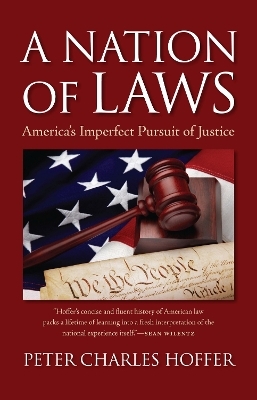
A Nation of Laws
An Introduction to American Legal History
Seiten
2010
University Press of Kansas (Verlag)
978-0-7006-1707-4 (ISBN)
University Press of Kansas (Verlag)
978-0-7006-1707-4 (ISBN)
America's founders extolled a nation of laws, for they knew that only a fairly enforced legal system could protect liberty and property against corruption and tyranny. Nearly two and a half centuries later, that system remains the ultimate safeguard for us all. This title recaptures the spirit of this grand enterprise.
America's founders extolled a nation of laws, for they knew that only a fairly enforced legal system could protect liberty and property against corruption and tyranny. Nearly two and a half centuries later, that system remains the ultimate safeguard for us all. With concise but penetrating and provocative insights, the eminent Peter Charles Hoffer recaptures the spirit of this grand enterprise while never losing sight of its human face. The distillation of four decades of stellar writing, Hoffer's book is a wise and illuminating meditation on the key concepts, history, evolution, and importance of American law. He brings the law to life through brief narratives and portraits drawn from the pages of our nation's history. He takes his readers on a tumultuous journey from the Salem witchcraft trials through the divisive debates over slavery; the long struggles for equality and civil rights; the moral and culture wars over abortion, gay rights, and the teaching of evolution; and, recent controversies concerning the rule of law in wartime. In a very compact space, Hoffer has a great deal to say about the role of law, lawmakers, law cases, lawyers, litigants, judges, law professors, and public opinion in creating and recreating the fabric that weaves all of these elements together. He pays particular attention to the criminal trial by looking at the legal proceedings against slave liberator John Brown, feminist Susan B. Anthony, and teacher of evolution John Scopes. He also explores what happens when the law is stretched to the breaking point by revisiting such events as the Stono Slave Rebellion, the Seneca Falls women's rights convention, and FDR's paradigm-shifting New Deal speech. Throughout, Hoffer carefully weighs the promise and vitality of our laws against its flaws and historical failures, for our legal system has not reflected a strong linear progress from inequality and privilege toward perfected liberty and dignity for all. His crystal clear vision of our legal history reminds us of the ambiguities and contradictions, quarrels and confrontations, that mirror the struggles within American history itself and reinforce the central role of law in American life.
America's founders extolled a nation of laws, for they knew that only a fairly enforced legal system could protect liberty and property against corruption and tyranny. Nearly two and a half centuries later, that system remains the ultimate safeguard for us all. With concise but penetrating and provocative insights, the eminent Peter Charles Hoffer recaptures the spirit of this grand enterprise while never losing sight of its human face. The distillation of four decades of stellar writing, Hoffer's book is a wise and illuminating meditation on the key concepts, history, evolution, and importance of American law. He brings the law to life through brief narratives and portraits drawn from the pages of our nation's history. He takes his readers on a tumultuous journey from the Salem witchcraft trials through the divisive debates over slavery; the long struggles for equality and civil rights; the moral and culture wars over abortion, gay rights, and the teaching of evolution; and, recent controversies concerning the rule of law in wartime. In a very compact space, Hoffer has a great deal to say about the role of law, lawmakers, law cases, lawyers, litigants, judges, law professors, and public opinion in creating and recreating the fabric that weaves all of these elements together. He pays particular attention to the criminal trial by looking at the legal proceedings against slave liberator John Brown, feminist Susan B. Anthony, and teacher of evolution John Scopes. He also explores what happens when the law is stretched to the breaking point by revisiting such events as the Stono Slave Rebellion, the Seneca Falls women's rights convention, and FDR's paradigm-shifting New Deal speech. Throughout, Hoffer carefully weighs the promise and vitality of our laws against its flaws and historical failures, for our legal system has not reflected a strong linear progress from inequality and privilege toward perfected liberty and dignity for all. His crystal clear vision of our legal history reminds us of the ambiguities and contradictions, quarrels and confrontations, that mirror the struggles within American history itself and reinforce the central role of law in American life.
Peter Charles Hoffer is Distinguished Research Professor of History at the University of Georgia. Williamjames Hull Hoffer is assistant professor of history at Seton Hall University. N. E. H. Hull is Distinguished Professor of Law at Rutgers University Law School. Collectively they have authored, coauthored, and edited more than three dozen books.
| Erscheint lt. Verlag | 30.3.2010 |
|---|---|
| Verlagsort | Kansas |
| Sprache | englisch |
| Maße | 163 x 221 mm |
| Gewicht | 423 g |
| Themenwelt | Geschichte ► Teilgebiete der Geschichte ► Militärgeschichte |
| Recht / Steuern ► EU / Internationales Recht | |
| Recht / Steuern ► Rechtsgeschichte | |
| ISBN-10 | 0-7006-1707-8 / 0700617078 |
| ISBN-13 | 978-0-7006-1707-4 / 9780700617074 |
| Zustand | Neuware |
| Haben Sie eine Frage zum Produkt? |
Mehr entdecken
aus dem Bereich
aus dem Bereich
neueste Manipulationstechniken als Waffengattung der NATO
Buch | Softcover (2023)
Westend (Verlag)
24,00 €


